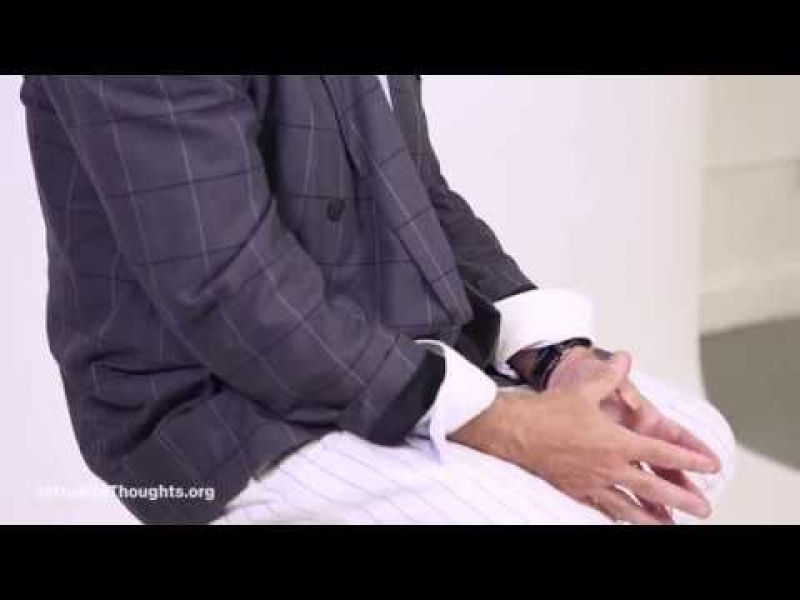Talking Scrupulosity with Dr. Phillipson
What is Scrupulosity and How Should it be Treated?
Written by Lauren O'Shaughnessy
01 Dr. Phillipson is a Licensed Clinical Psychologist practicing in New York City.
02 In this video, he defines and discusses Scrupulosity. For more info on Dr. Phillipson, please visit: https://www.ocdonline.com/
03 OCD3 is a web series that brings professional perspectives to the OCD community so sufferers can make healthy decisions and lead better lives.

OCD3: What is Religious OCD (Scrupulosity)?
Read the full transcript below:
1) What is Scrupulosity?
Scrupulosity is an observed condition from the 1600s in the Catholic church. Monks were noticed engaging in repetitive and excessive prayer. People recognized that the monks behavior and adherence to correct prayer was not at all in keeping with what they would hope to be an expression of God’s love. Instead, the monks were trying to achieve an unrealistic state of holiness. The term scrupulosity grew out of those observations from the 1600s.
Scrupulosity as a subset of OCD exists when persons are overly preoccupied with doing the “right thing,” whether that means religiously, morally or ethically. A person with scrupulosity will pray over and over again until they achieve a state of certainty that god would approve of. In other words, they’ve gotten everything correct and pronounced every word in a way that god would recognize as sincere.
Scrupulosity with religion involves engaging in excessive rumination to prove that you haven’t said something that god might consider blasphemous. A person might also engage in excessive confessions to a rabbi or a priest, or feel as if they’re in a state of ungodliness or distance from God’s love because of their thoughts. Their rituals are them trying to get closure so they can put those thoughts behind them and move forward with a clear conscious.
2) What are common symptoms?
A way to differentiate scrupulosity from a person who is authentically devout, is that someone without scrupulosity engages in behavior that fits their standards and values, and feels a sense of satisfaction that they are serving God’s will. They feel a sense of accomplishment for living their life in a way they see as positive and ethical. They may slip up, but they aren’t constantly afraid they they’re living in sin.
A person with scrupulosity is desperately trying to discount their brain’s accusation that they’ve done something wrong. They never fully achieve satisfaction, and often get stuck in an endless loop of escaping guilt or trying to rid themselves of anxiety. There is a complete lack of fulfillment in their behavior because it’s often alien to what their actual values are (i.e. their thoughts and their beliefs are misaligned). This causes a tremendous amount of torment during prayer and confessions, whereas a person who has an authentically devout religious attachment would leave confession feeling satisfied.
Common symptoms of scrupulosity involve an excessive preoccupation with doing the right thing through god’s eyes or by societal standards. That might involve using a significant other to constantly confess to, doing tons of internet research into the thoughts you’re having, or visiting a church/synagogue/mosque to convince yourself that you’re engaging in the correct religious behavior.
Scrupulosity can also exist without being tied to religion. Some people become obsessed with being ethical right all the time, outside of specific religious rules. For instance, a person might say they arrived home at 4:30 when it was actually 4:31. They might then think “oh boy I’ve lied about my arrival time” and try to restate their time to represent 4:31 exactly. So, scrupulosity can exist as this preoccupation with correctness towards god’s wishes or towards societal standards of ethics.
3) What are common misconceptions?
I think the most common misconception is that someone with scrupulosity might actually consider themselves to be more devout than someone without scrupulosity. And once again, there is no greater proclivity towards a person’s character in being more devout. It’s just their brain artificially creating that agenda. Without that energy of guilt and anxiety, a person would not have any more tendency to be religiously correct.
4) How can you help someone suffering from Religious OCD?
If someone notices a family or friend being excessively conscious about religion or law or legality or ethics, it’s important to bring that behavior to the person’s attention as something that might be a treatable condition, as opposed to being a desirable tendency to constantly acquire closure or validation for their ethical/religious behavior.
5) What does recovery look like?
Recovery for someone with scrupulosity involves the person’s actions being dictated by their actual authentic values and moral standards, rather than being dictated by guilt or anxiety. They’ll go back to living a more natural and peaceful existence in terms of their decision making, rather than being manipulated by guilt.
For more videos from our OCD3 series, head to our YouTube channel here.
About the author
Lauren is the editorial director and cofounder at the Made of Millions Foundation. She has been a part of the team since its launch in 2016. She has been open about her personal struggles with Generalized Anxiety Disorder and social phobia. You can follow her on Instagram at www.instagram.com/internet_lauren.
Support our work
We’re on a mission to change how the world perceives mental health.



















